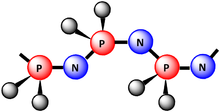Inorganic polymer

In polymer chemistry, an inorganic polymer is a polymer with a skeletal structure that does not include carbon atoms in the backbone.[1] Polymers containing inorganic and organic components are sometimes called hybrid polymers,[2] and most so-called inorganic polymers are hybrid polymers.[3] One of the best known examples is polydimethylsiloxane, otherwise known commonly as silicone rubber. Inorganic polymers offer some properties not found in organic materials including low-temperature flexibility, electrical conductivity, and nonflammability.[4] The term inorganic polymer refers generally to one-dimensional polymers, rather than to heavily crosslinked materials such as silicate minerals. Inorganic polymers with tunable or responsive properties are sometimes called smart inorganic polymers. A special class of inorganic polymers are geopolymers, which may be anthropogenic or naturally occurring.
Main group backbone
[edit]Traditionally, the area of inorganic polymers focuses on materials in which the backbone is composed exclusively of main-group elements.
Homochain polymers
[edit]Homochain polymers have only one kind of atom in the main chain.[5] One member is polymeric sulfur, which forms reversibly upon melting any of the cyclic allotropes, such as S8. Organic polysulfides and polysulfanes feature short chains of sulfur atoms, capped respectively with alkyl and H. Elemental tellurium and the gray allotrope of elemental selenium also are polymers, although they are not processable.

Polymeric forms of the group IV elements are well known. The premier materials are polysilanes, which are analogous to polyethylene and related organic polymers. They are more fragile than the organic analogues and, because of the longer Si−Si bonds, carry larger substituents. Poly(dimethylsilane) is prepared by reduction of dimethyldichlorosilane.[6] Pyrolysis of poly(dimethylsilane) gives SiC fibers.
Heavier analogues of polysilanes are also known to some extent. These include polygermanes, [R2Ge]n, and polystannanes, [R2Sn]n.
Heterochain polymers
[edit]Si-based
[edit]Heterochain polymers have more than one type of atom in the main chain. Typically two types of atoms alternate along the main chain. Of great commercial interest are the polysiloxanes, where the main chain features Si and O centers: −Si−O−Si−O−. Each Si center has two substituents, usually methyl or phenyl. Examples include polydimethylsiloxane (PDMS, [Me2SiO]n), polymethylhydrosiloxane (PMHS, [MeSi(H)O]n) and polydiphenylsiloxane [Ph2SiO]n).[5] Related to the siloxanes are the polysilazanes. These materials have the backbone formula −Si−N−Si−N−. One example is perhydridopolysilazane PHPS. Such materials are of academic interest.
P-based
[edit]A related family of well studied inorganic polymers are the polyphosphazenes. They feature the backbone −P−N−P−N−. With two substituents on phosphorus, they are structurally similar related to the polysiloxanes. Such materials are generated by ring-opening polymerization of hexachlorophosphazene followed by substitution of the P−Cl groups by alkoxide. Such materials find specialized applications as elastomers.[5]

B-based
[edit]Boron–nitrogen polymers feature −B−N−B−N− backbones. Examples are polyborazylenes,[7] polyaminoboranes.[8][9]
S-based
[edit]The polythiazyls have the backbone −S−N−S−N−. Unlike most inorganic polymers, these materials lack substituents on the main chain atoms. Such materials exhibit high electrical conductivity, a finding that attracted much attention during the era when polyacetylene was discovered. It is superconducting below 0.26 K.[10]
Ionomers
[edit]Usually not classified with charge-neutral inorganic polymers are ionomers. Phosphorus–oxygen and boron-oxide polymers include the polyphosphates and polyborates.
Transition-metal-containing polymers
[edit]Inorganic polymers also include materials with transition metals in the backbone. Examples are Polyferrocenes, Krogmann's salt and Magnus's green salt.

Polymerization methods
[edit]Inorganic polymers are formed, like organic polymers, by:
- Step-growth polymerization: Polysiloxanes;
- Chain-growth polymerization: Polysilanes;
- Ring-opening polymerization: Poly(dichlorophosphazene).
Reactions
[edit]Inorganic polymers are precursors to inorganic solids. This type of reaction is illustrated by the stepwise conversion of ammonia borane to discrete rings and oligomers, which upon pyrolysis give boron nitrides.[7]
References
[edit]- ^ IUPAC, Compendium of Chemical Terminology, 2nd ed. (the "Gold Book") (1997). Online corrected version: (2006–) "inorganic polymers". doi:10.1351/goldbook.IT07515
- ^ IUPAC, Compendium of Chemical Terminology, 2nd ed. (the "Gold Book") (1997). Online corrected version: (2006–) "hybrid polymers". doi:10.1351/goldbook.HT07556
- ^ Inorganic Two-dimensional Nanomaterials, Editor: Changzheng Wu, Royal Society of Chemistry, Cambridge 2017.
- ^ Manners, Ian, "Polymers and the periodic table: recent developments in inorganic polymer science", Angewandte Chemie, International Edition in English 1996, volume 35, 1603–1621. doi:10.1002/anie.199616021.
- ^ a b c Mark, J. E.; Allcock, H. R.; West, R. “Inorganic Polymers”, Prentice Hall, Englewood, NJ: 1992. ISBN 0-13-465881-7.
- ^ Miller, R. D.; Michl (1989). "Polysilane High Polymers" J". Chem. Rev. 1989 (89): 1359–1410. doi:10.1021/cr00096a006.
- ^ a b S. Bernard; C. Salameh; P. Miele (2016). "Boron nitride ceramics from molecular precursors: synthesis, properties and applications". Dalton Trans. 45 (3): 861–873. doi:10.1039/c5dt03633j. PMID 26646607.
- ^ E. M. Leitao; T. Jurca; I. Manners (2013). "Catalysis in service of main group chemistry offers a versatile approach to p-block molecules and materials". Nature Chemistry. 5 (10): 817–829. doi:10.1038/nchem.1749. PMID 24056337.
- ^ H. C. Johnson; T. N. Hooper; A. S. Weller (2015). "The Catalytic Dehydrocoupling of Amine–Boranes and Phosphine–Boranes". Synthesis and Application of Organoboron Compounds. Topics in Organometallic Chemistry. Vol. 49. pp. 153–220. doi:10.1007/978-3-319-13054-5_6. ISBN 978-3-319-13053-8.
{{cite book}}:|journal=ignored (help) - ^ M. M. Labes; P. Love; L. F. Nichols (1979). "Polysulfur nitride - a metallic, superconducting polymer". Chem. Rev. 79 (1): 1–15. doi:10.1021/cr60317a002.
